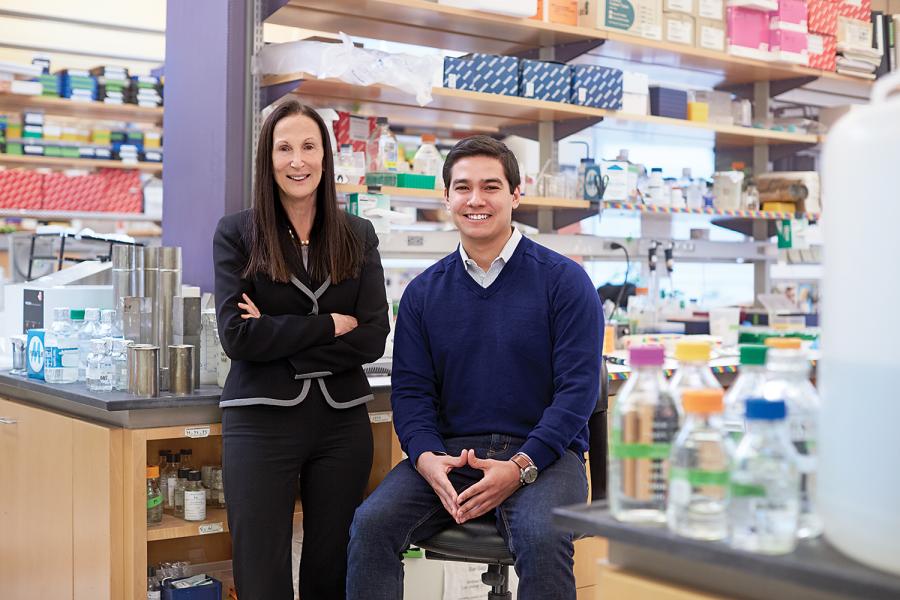
Faculty Mentoring
NYU Grossman School of Medicine’s Office of Mentoring and Faculty Development guides our departments in launching and maintaining mentoring programs that support tenure-eligible or nontenure-eligible clinical and research faculty. These programs help our departments recruit promising new faculty, develop and retain outstanding junior faculty, and propel career advancement—thus strengthening the NYU Grossman School of Medicine community as a whole.
Our mentoring and development programs are implemented across NYU Grossman School of Medicine and are tailored to the many career pathways available to physicians and scientists.
Mentoring Roles
A successful mentoring program requires broad commitment and involvement. It includes mentees, mentors, and mentoring champions, who are supported by department chairs to oversee the programs and to meet deans’ expectations.
Establishing a Faculty Mentoring Program
At NYU Grossman School of Medicine, each department’s mentoring champion works with the Office of Mentoring and Faculty Development to create a tailored mentoring program.
Making suitable matches of mentors and mentees is critical to the success of a faculty mentoring program. The Office of Mentoring and Faculty Development recommends that personalities, professional approaches, and career paths all be considered when matching mentors with mentees. In addition, departmental annual mentoring surveys should be used to facilitate matches and to report the effectiveness of established mentoring relationships.
Several individuals play a role in each department’s mentoring program.
Department Chairs and Mentoring Champions
Department chairs appoint mentoring champions, who oversee the mentoring program, and remain actively involved in it. Department chairs also ensure that mentoring teams meet and assess their effectiveness.
A mentoring champion serves as a liaison between the Office of Mentoring and Faculty Development and the program and supports the chair in overseeing faculty mentoring and development. Mentoring champions also develop a pool of mentors and meet regularly with them, provide administrative oversight, implement training programs, and provide information on mentoring and professional development to the department.
The champion ensures that an annual mentoring letter is written, reviewed, and signed at a meeting between the mentee and the chair and submitted to Faculty Records. This summary proves valuable when the mentee is being considered for departmental appointments or for promotion or tenure.
Faculty Mentors
Mentors offer junior faculty guidance that may include the following:
- defining, narrowing, or expanding a research focus or career path
- establishing professional liaisons
- advising on procuring funding
- shepherding mentees through the promotion and tenure process
- assisting in accessing professional development resources
- exploring alternative careers in administration, education, quality, or safety
Mentors provide honest, meaningful feedback to mentees and document their progress through the annual mentoring letter.
Mentoring responsibilities are ideally shared among a department’s senior faculty. The most effective mentors are often highly sought after, but they can become ineffective if they don’t have sufficient time to foster a mentee’s strengths and potential. Mentoring tenure-eligible faculty may be more time consuming than mentoring nontenure-eligible faculty, and mentoring research faculty may require more detailed input than mentoring clinician investigator educators.
We encourage mentors to use the appropriately tailored templates to record details of mentoring encounters, timelines, and progress metrics; to compose yearly reports; and to perform surveys. This helps ensure uniformity in the mentoring process, guides mentoring discussions, documents progress, and saves the mentor valuable time.
Faculty Mentees
Mentees are responsible for meeting goals and deadlines, arranging meetings with mentors, and keeping mentors apprised of their progress. They may provide feedback on the mentoring process in the following ways:
- during their annual evaluation with the department chair
- in mentoring experience surveys and third- and sixth-year review forms (if they are tenure-eligible faculty)
- through discussions with the department’s mentoring champion
- to leadership in the Office of Mentoring and Faculty Development
- to leadership in the Office of Education, Faculty, and Academic Affairs
Deans
NYU Grossman School of Medicine deans are responsible for ensuring widespread, effective faculty mentoring and faculty development and satisfaction. They provide and enforce accountability in mentoring metrics, offer structure and support for the program’s implementation, and mandate the chairs’ support and involvement.
